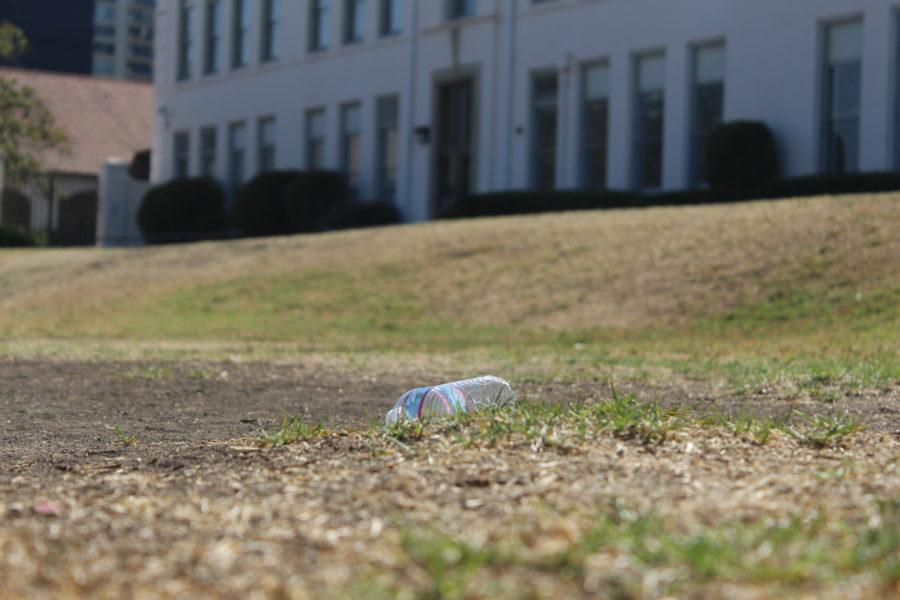Eleanor Bogart-Stuart, staff writer
Jackson Prince, co-editor-in-chief
California is currently in the midst of a true environmental crisis. For the past few years, with each watering of the Front Lawn and late-night jacuzzi, citizens of the Golden State lose more water, digging themselves further into what is one of the most severe droughts in the state’s history.
Being one of the most austere droughts on record, the situation was declared a State of Emergency by Governor Jerry Brown in January. Despite this call-to-action, California has experienced several slip-ups in the past months.
The infamous spillage of about 20 million gallons of water on Sunset Boulevard in late July helped sophomore Jeff Lee to recognize the issue.
“I believe that we have to start conserving our water and treat it more preciously. We can’t have things like the water spill that just occurred recently. The forecast reports show that rainfall will be very scarce in the upcoming years, so we must focus on conserving our water until we get rain,” Lee said.
Reacting to the drought, the state has passed several new laws and regulations swiftly. On Sept. 16, Brown signed a piece of legislation which tightened the management and care of groundwater basins, a vital source for California water.
“We have to learn to manage wisely water, energy, land and our investments,” Brown said in an official statement. “That’s why this is important.”
According to Mercury News, this August Californians used 27 billion gallons less water than last August. Currently, the state has cut back on water use by 11.5 percent.
“We’re pleased that the trend is continuing upward,” Felicia Marcus, chairwoman of the State Water Resources Control Board said in an official statement. “Every gallon saved now is a gallon that we won’t have to ration in the future. We’re already seeing such a devastating impact from this drought. And if it doesn’t rain this winter, even more people are going to be in a world of hurt.”
Chief sustainability and economic development officer for the Los Angeles Department of Water and Power Nancy Sutley admitted that this drought may not be something that will be ending soon in an online statement.
“Whether it’s 25 years in a mega-drought or repeatedly any number of years over the next 25 years… we have to look at all the sources of water that are potentially available to us,” she said.
While Beverly Hills isn’t the most serious abuser, some of the worst water wasters in California are its neighbors: La Habra, El Segundo and Huntington Park. These communities increased their water use in the past year.
Some Beverly students, and even classes, have become more conscious about this water shortage.
“I think it’s actually really scary,” sophomore Bennett Gershwin said. “In photography we make sure to wash our prints on a very low water pressure to use as little as possible, and we clean our trays from the runoff on the cleaners.”
Substitute teacher Richard Kraft has also stepped up. Following the 20-million gallon spill on Sunset, Kraft started makeitupla.org, whose goal is to “show that small, individual actions can add up in a big way to have a big impact.”
“After the water main break at UCLA, I asked myself if the 20-million gallons [of water] were actually lost, or if they could be reclaimed,” he said. “The only way to reclaim that water is for people to change their behavior going forward, which is what the website helps to do. People can go to this website and pledge to change some behavior in the future. Each action has an amount of water saved assigned to it, and the site takes their pledge and the water associated with the pledge and updates the number of gallons saved per hour due to the more water-conscientious behavior. Our goal is to reach 20-million gallons.”
Kraft, who has been “disturbed” by the drought and its effects, hopes that students get involved as well.
“Students can find behaviors on the site that they can choose to follow,” he said. “Additionally, water agencies in the state are encouraging citizens to let their lawns go dry, giving out financial dividends for such actions. They could consider letting the front lawn go brown during the drought as a way to educate others about the importance of water conservation.”
Brown requested that Californians reduce their water usage by 20 percent. Some ways to conserve water are to use sprinklers sparingly and not in the heat of the day, to take shorter showers and to fix all leaky faucets and toilet tanks, according to Kraft’s website.

To view Norman water use and the effects of the drought, click here.
Graphic by: Karen Shilyan, business manager Ben Shofet, graphics editor
Categories:
Californians, Normans take action in midst of historic drought
October 10, 2014
0
Donate to Highlights
$125
$1000
Contributed
Our Goal
Your donation will support the student journalists of Beverly Hills High School. Your contribution will allow us to purchase equipment and cover our annual website hosting costs.
More to Discover






























